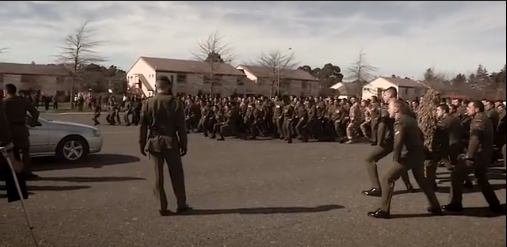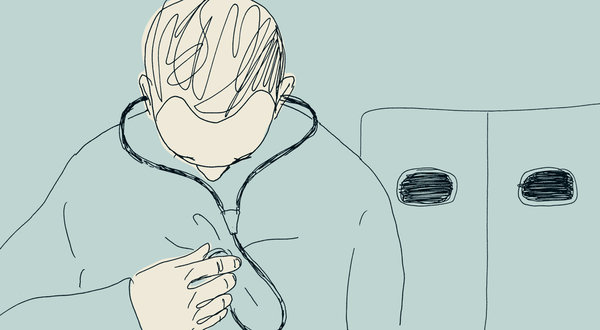One of the most moving of the many cultural expressions of respect and grief at the end of a life is the Haka, a traditional ancestral war cry, dance or challenge from the Māori people of New Zealand.
15 Things You Should Never Say To A Bereaved Person
By Carole Brody Fleet
“I’m afraid of saying the wrong thing.”
The number of times that I’ve heard these sentiments expressed by those who surround the widowed are countless. Unfortunately, many seem to have lost sight of the fact that the words, “I’m so sorry” can be the most comforting words of all. As a result and even though it may be in an attempt to console, people can instead wind up saying some pretty ridiculous things. Having been widowed myself and at the receiving end of some of these comments (and worse), I continue to be amazed at what some say in the guise of sympathy.
Following are actual expressions of “compassion” that have been shared with widowed; including what oftentimes goes through bereaved person’s mind when hearing these expressions. We’ll call this, “What Not to Say…Ever!”:
1. When someone says: “At least you were prepared” (when death is anticipated).
What the widowed are thinking is: “Expecting death doesn’t make the reality of death any easier.”
2. When someone says: “At least s/he didn’t suffer” (when death is sudden).
What the widowed are thinking is: “That made things easier on them … not me.”
3. When someone says: “Everything happens for a reason.”
What the widowed are thinking is: “Whatever that ‘reason’ is, I’m not interested in hearing it.”
4. When someone says: “You were just meant to be alone.”
What the widowed are thinking is: “If I were meant to be alone, I wouldn’t have gotten married in the first place.”
5. When someone says: “I know how you feel.”
What the widowed are thinking is: “No you don’t, because you are not me and losses cannot be compared.”
6. When someone says: “You’ll find someone else.”
What the widowed are thinking is: “What makes you think that I’m looking for someone else right now?”
7. When someone says: “You should be ‘over it’ already.”
What the widowed are thinking is: “Well, I’m not ‘over it’ and I’m sorry if my healing timeline doesn’t fit your timeline.”
8. When someone says: “Now you’ll have closure.”
What the widowed are thinking is: “I don’t want to ‘close’ any part of my life. What does that even mean?”
9. When someone says: “S/He’s in a better place.”
What the widowed are thinking is: “Better than here with me?”
10. When someone says: “You can always get a pet to replace him/her.” (Yes, someone actually said that.)
What the widowed are thinking is: “You’re kidding, right?”
11. When someone says: “Divorce is the same.”
What the widowed are thinking is: “It’s not the same. I understand you’ve experienced the ‘death’ of a relationship. But in your case, someone somewhere made a choice. No one ‘chose’ to leave my marriage.”
12. When someone says: “You were married for so many years and he/she lived a long life.”
What the widowed are thinking is: “That doesn’t matter. It will never be long enough.”
13. When someone says: “You’re not really a widow/er because you were only married for…” (a short time).
What the widowed are thinking is: “I missed the part of the wedding ceremony that said how long we had to be married before it ‘counted’ toward widowhood.”
14. When someone says: “You weren’t technically married so you’re not really widowed.”
What the widowed are thinking is: “My heart doesn’t understand technicalities. My heart only knows that the person with whom I planned to spend the rest of my life is gone.”
15. When someone says: “S/He was my brother/sister/other relative. You weren’t technically related.”
What the widowed are thinking is: “Please make sure that I’m standing there when you tell our children that Mom and Dad weren’t technically related.”
The common thread in all of these statements (and many more like them) is that while most may be said in an attempt to comfort, absolutely none of these statements will console anyone.
So what should you say to a widowed instead?
Express genuine sympathy: “I’m so sorry; I can’t even begin to imagine the pain you’re in right now.”
You have provided immediate comfort and a sense of reassurance to someone whose world has been rocked; as well as reassurance that they don’t have to face this bleakest of seasons on their own.
Encourage dialogue: “You might not be ready to talk about it today, but when you’re ready, I’m here to listen.”
One of the most helpful things in the world is a kind ear and it is after the funeral, when everyone else has seemingly disappeared that your compassion is needed the most.
You really can be the first avenue of comfort to a widowed. No longer are the excuses, “I don’t know what to say” or “I’m afraid of saying the wrong thing” acceptable. While I’m not sure that I ever bought into the cliché that, “Ignorance is bliss,” this I know for certain:
When it comes to consoling the bereaved, ignorance is not “bliss.”
It is instead a gigantic miss.
Complete Article HERE!
When Doctors Grieve
COMMENTARY — Leeat Granek
MY mother died of breast cancer in 2005 after living with the disease for nearly 20 years. Her oncologist, whom I knew from the time I was 9 years old, was her doctor for most of that time. I practically grew up in the hospital, and my family felt quite close to the health care providers, especially the oncologist. After my mother died I wondered if the feeling was mutual.
Do doctors grieve when their patients die? In the medical profession, such grief is seldom discussed — except, perhaps, as an example of the sort of emotion that a skilled doctor avoids feeling. But in a paper published on Tuesday in Archives of Internal Medicine (and in a forthcoming paper in the journal Death Studies), my colleagues and I report what we found in our research about oncologists and patient loss: Not only do doctors experience grief, but the professional taboo on the emotion also has negative consequences for the doctors themselves, as well as for the quality of care they provide.
Our study took place from 2010 to 2011 in three Canadian hospitals. We recruited and interviewed 20 oncologists who varied in age, sex and ethnicity and had a wide range of experience in the field — from a year and a half in practice in the case of oncology fellows to more than 30 years in the case of senior oncologists. Using a qualitative empirical method known as grounded theory, we analyzed the data by systematically coding each interview transcript line by line for themes and then comparing the findings from each interview across all interviews to see which themes stood out most robustly.
We found that oncologists struggled to manage their feelings of grief with the detachment they felt was necessary to do their job. More than half of our participants reported feelings of failure, self-doubt, sadness and powerlessness as part of their grief experience, and a third talked about feelings of guilt, loss of sleep and crying.
Our study indicated that grief in the medical context is considered shameful and unprofessional. Even though participants wrestled with feelings of grief, they hid them from others because showing emotion was considered a sign of weakness. In fact, many remarked that our interview was the first time they had been asked these questions or spoken about these emotions at all.
The impact of all this unacknowledged grief was exactly what we don’t want our doctors to experience: inattentiveness, impatience, irritability, emotional exhaustion and burnout.
Even more distressing, half our participants reported that their discomfort with their grief over patient loss could affect their treatment decisions with subsequent patients — leading them, for instance, to provide more aggressive chemotherapy, to put a patient in a clinical trial, or to recommend further surgery when palliative care might be a better option. One oncologist in our study remarked: “I see an inability sometimes to stop treatment when treatment should be stopped. When treatment’s futile, when it’s clearly futile.” From a policy standpoint, this is an especially worrisome finding, given the disproportionately high percentage of heath care budgets spent on end-of-life care.
Unease with losing patients also affected the doctors’ ability to communicate about end-of-life issues with patients and their families. Half of our participants said they distanced themselves and withdrew from patients as the patients got closer to dying. This meant fewer visits in the hospital, fewer bedside visits and less overall effort directed toward the dying patient.
It’s worth stressing that most physicians want what is best for their patients and that the outcome of any medical intervention is often unknown. It’s also worth noting that oncologists and other physicians who are dealing with end-of-life issues are right to put up some emotional boundaries: no one wants their doctor to be walking around openly grief-stricken.
But our research indicates that grief is having a negative impact on oncologists’ personal lives and that there is a troubling relationship between doctors’ discomfort with death and grief and how patients and their families are treated. Oncologists are not trained to deal with their own grief, and they need to be. In addition to providing such training, we need to normalize death and grief as a natural part of life, especially in medical settings.
To improve the quality of end-of-life care for patients and their families, we also need to improve the quality of life of their physicians, by making space for them to grieve like everyone else.
Leeat Granek is a health psychologist and a postdoctoral fellow at the Hospital for Sick Children in Toronto.
Complete Article HERE!



